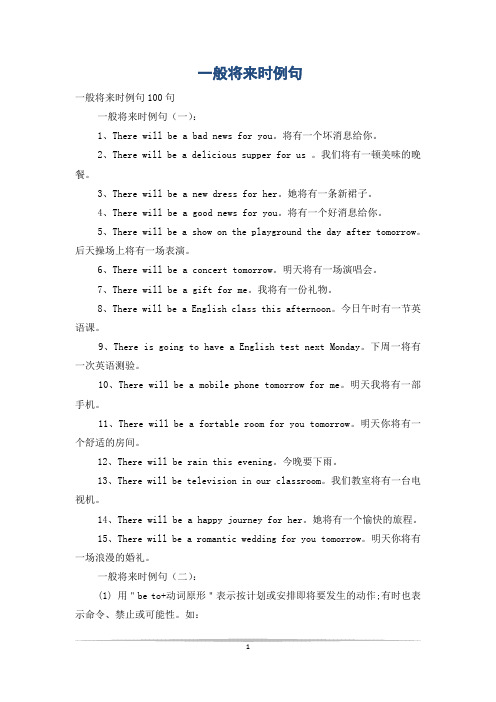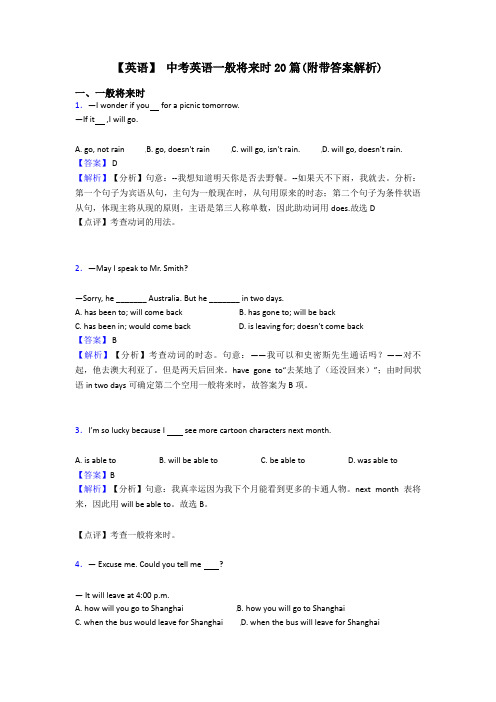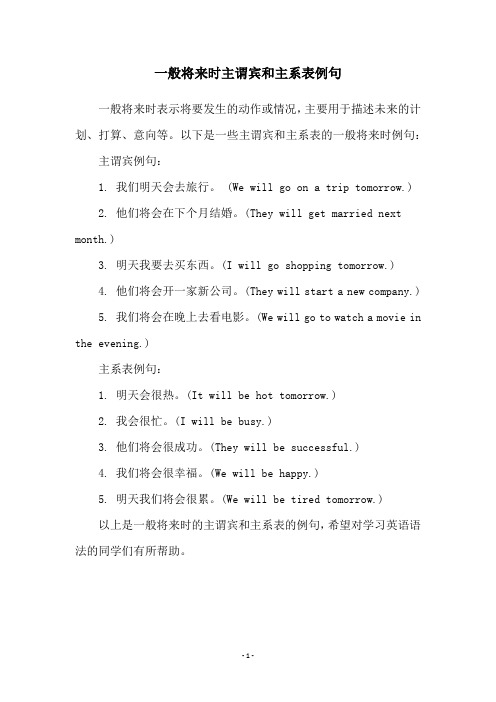一般将来时的句子带翻译(最新)
-一般将来时的四种句型

一般将来时的四种句型1. “主语+will+动词原形”句型。
哎呀,比如说,“I will go shopping tomorrow.”(我明天会去购物。
)你看,这多简单直接呀,我就是明确地表达了我明天要去做的事情呢。
2. “主语+be going to+动词原形”句型。
嘿,就像“He is going to play basketball this afternoon.”(他今天下午打算去打篮球。
)这不是很清楚地说出了他的计划嘛。
3. “will be+形容词/名词”句型。
哇塞,“It will b e sunny tomorrow.”(明天会是晴天。
)这样就能轻松描述未来的状态啦。
4. “be going to be+形容词/名词”句型。
你想想,“She is going to be a great singer.”(她将会成为一名很棒的歌手。
)多有憧憬呀!5. “主语+will+be+动词的现在分词”句型。
像“ They will be waiting for us at the station.”(他们将会在车站等我们。
)多形象呀!6. “主语+be going to+be+动词的现在分词”句型。
“We are going to be having a party tonight.”(我们今晚将会举行一个派对。
)是不是很带感?7. “will+have+过去分词”句型。
“I will have finished my work by 5 p.m.”(到下午 5 点我将会完成我的工作。
)多有成就感呀!8. “be going to+have+过去分词”句型。
“They are going to have built the house by next month.”(到下个月他们将会建好那所房子。
)多厉害呀!9. “will+动词原形+其他成分”句型。
“He wille and help you.”(他会来帮助你。
一般将来时例句

一般将来时例句一般将来时例句100句一般将来时例句(一):1、There will be a bad news for you。
将有一个坏消息给你。
2、There will be a delicious supper for us 。
我们将有一顿美味的晚餐。
3、There will be a new dress for her。
她将有一条新裙子。
4、There will be a good news for you。
将有一个好消息给你。
5、There will be a show on the playground the day after tomorrow。
后天操场上将有一场表演。
6、There will be a concert tomorrow。
明天将有一场演唱会。
7、There will be a gift for me。
我将有一份礼物。
8、There will be a English class this afternoon。
今日午时有一节英语课。
9、There is going to have a English test next Monday。
下周一将有一次英语测验。
10、There will be a mobile phone tomorrow for me。
明天我将有一部手机。
11、There will be a fortable room for you tomorrow。
明天你将有一个舒适的房间。
12、There will be rain this evening。
今晚要下雨。
13、There will be television in our classroom。
我们教室将有一台电视机。
14、There will be a happy journey for her。
她将有一个愉快的旅程。
15、There will be a romantic wedding for you tomorrow。
小学英语03一般将来时

什么是一般将来时?一般将来时表示将来某一时刻的动作或状态,或将来某段时间内经常的动作或状态。
常用的基本形式有三种:will/shall结构;be going to结构;be about to结构一.will/shall 结构1.基本结构:主语+will/shall+ 动词原形表示将来发生的事情或是主语将要发生的行为,也用于征求对方的意见或表示客气的邀请。
It will be sunny tomorrow.明天将是个好天气。
(表示将来发生的状况)I will come back soon.我很快就回来。
(表示主语将要发生的行为)Will you please open the window?请你把窗打开,好吗?(表示征求对方的意见)小提醒★一般将来时任何主语都可以用will但书面语中第一人称常用shall。
I shall study harder at English.我将更加努力地学习英语。
Shall we go to see a film?我们去看电影好吗?★will,shall和主语都可以缩写成’llI’ll fly to London.我要坐飞机去伦敦。
They’ll visit the museum tomorrow.他们明天要参观博物馆。
2. 一般疑问句:将will/shall提到句首Will you go there?你要去那儿吗?3.否定句:在will/shall后加not,可缩写成won't/shan't陈述句:I will go there./I shall go there.我要去那儿。
否定句:I won't go there. /I shan't go there.我不去那儿。
4. 特殊疑问句:特殊疑问词+ will/shall +主语+动词原形+其他?What will he do this evening?今晚他准备做什么?(针对动词提问)When will you visit him?你什么时候去拜访他?(针对时间提问)Where will they have a running race?他们准备在哪里赛跑?(针对地点提问)二.be going to结构be going to表示主观的打算或计划,一般指近期或事先考虑过的将要发生的动作以及已有迹象表明必将发生某事,意为“打算,就要”。
【英语】 中考英语一般将来时20篇(附带答案解析)

【英语】中考英语一般将来时20篇(附带答案解析)一、一般将来时1.—I wonder if you for a picnic tomorrow.—If it ,I will go.A. go, not rainB. go, doesn't rainC. will go, isn't rain.D. will go, doesn't rain.【答案】 D【解析】【分析】句意:--我想知道明天你是否去野餐。
--如果天不下雨,我就去。
分析:第一个句子为宾语从句,主句为一般现在时,从句用原来的时态;第二个句子为条件状语从句,体现主将从现的原则,主语是第三人称单数,因此助动词用does.故选D【点评】考查动词的用法。
2.—May I speak to Mr. Smith?—Sorry, he _______ Australia. But he _______ in two days.A. has been to; will come backB. has gone to; will be backC. has been in; would come backD. is leaving for; doesn't come back【答案】 B【解析】【分析】考查动词的时态。
句意:——我可以和史密斯先生通话吗?——对不起,他去澳大利亚了。
但是两天后回来。
have gone to“去某地了(还没回来)”;由时间状语in two days可确定第二个空用一般将来时,故答案为B项。
3.I’m so lucky because I see more cartoon characters next month.A. is able toB. will be able toC. be able toD. was able to【答案】B【解析】【分析】句意:我真幸运因为我下个月能看到更多的卡通人物。
一般将来时主谓宾和主系表例句

一般将来时主谓宾和主系表例句
一般将来时表示将要发生的动作或情况,主要用于描述未来的计划、打算、意向等。
以下是一些主谓宾和主系表的一般将来时例句:主谓宾例句:
1. 我们明天会去旅行。
(We will go on a trip tomorrow.)
2. 他们将会在下个月结婚。
(They will get married next month.)
3. 明天我要去买东西。
(I will go shopping tomorrow.)
4. 他们将会开一家新公司。
(They will start a new company.)
5. 我们将会在晚上去看电影。
(We will go to watch a movie in the evening.)
主系表例句:
1. 明天会很热。
(It will be hot tomorrow.)
2. 我会很忙。
(I will be busy.)
3. 他们将会很成功。
(They will be successful.)
4. 我们将会很幸福。
(We will be happy.)
5. 明天我们将会很累。
(We will be tired tomorrow.)
以上是一般将来时的主谓宾和主系表的例句,希望对学习英语语法的同学们有所帮助。
- 1 -。
一般将来时例句

一般将来时例句1. I'm going to travel around the world one day. (哎呀,你想想,去世界各地旅行,那该有多棒啊!)2. She'll become a famous singer in the future. (她以后肯定会成为一个著名歌手的,就像周杰伦那样!)3. They are going to have a big party next week. (哇塞,下周他们要举办一个盛大的派对呢!)4. He'll buy a luxury car when he has enough money. (等他钱够了,他肯定会买一辆豪车,这不是很让人期待嘛!)5. We're going to watch a movie tonight. (今晚我们要去看电影啦,好开心呀!)6. You'll regret if you don't seize this opportunity. (你要是不抓住这个机会,你肯定会后悔的呀,你难道不知道吗?)7. The company will expand its business next year. (这个公司明年会拓展业务呢,就像一棵大树不断生长!)8. I'll write a book about my adventures. (我会写一本关于我冒险经历的书,那得多有趣呀!)9. They'll build a new house in the countryside. (他们要在乡下建一座新房子,多美好的事情呀!)10. She'll give a wonderful speech at the conference. (她会在会议上做一个精彩的演讲,肯定会惊艳全场的!)我的观点结论:一般将来时真的很有魅力呀,可以让我们对未来充满期待和想象呢!。
一般将来时的12种表现形式(附词典例句)

一般将来时的12种表现形式(附词典例句)以下例句均出自词典(有标注)1.will /shall do 其中shall多用于第1人称;will可用于第2/3/1人称2.be going to do 表示决定、打算、计划做某事3.be doing4.be to do 表示计划、安排、约定、意图、将要,应该接近于should, ought to等5.be about to do6.be on the point of doing7.be due to do sth预定/预期/预计做某事8.祈使句9.倒装句——全倒装(只用一般过去时、一般现在时)10.情态动词 + do11.主将从现12.一般现在时的形式——表达将来的含义以下具体分述。
一般将来时的表现形式:以下例句均出自词典或高考真题(有标注)1.will /shall do 其中shall多用于第1人称;will可用于第2/3/1人称表示将要发生的动作或存在的状态表示倾向、习惯、必然发生的事shall用于第2/3人称,表示意志/决心/规定/必然性A meeting will be held next Tuesday at 3p.m.下星期二下午3点将召开一个会议(朗文5p2895)What time will she arrive? 她什么时候到达?(朗文5p2895)Trish will keep asking silly questions.特里斯老是不停地问一些愚蠢的问题。
(表示习惯,同上)Oil will float on water. 油总是浮于水面。
(表示总是、必然,朗文5p2895)Accidents will happen. 意外总是难免的。
(表示总是、惯于,朗文5p2895)We shall be away next week. 我们下周要出去。
(朗文5p2307)I’ve never liked her and I never shall. 我从来都不喜欢她,以后也不会。
一般将来时的四种句型

一般将来时的四种句型一、will + 动词原形1.肯定句•结构:主语+ will + 动词原形+ 其他。
•例句及解释:I will play football tomorrow.(我明天将踢足球。
)在这个句子中,“I” 是主语,表示动作的执行者,“will play” 是一般将来时的结构,“play football” 是谓语部分,表明动作是踢足球,“tomorrow” 是时间状语,说明动作发生的时间是明天。
•用途:用于表达主观意愿、意图、承诺、预测等。
例如:She will help you.(她会帮助你。
)这里表达了她主观上愿意帮助别人的意愿。
He will be a great singer in the future.(他将来会成为一名伟大的歌手。
)这是对未来的一种预测。
2.否定句•结构:主语+ will not(won't)+ 动词原形+ 其他。
•例句及解释:He won't come to the party tonight.(他今晚不会来参加聚会。
)“He” 是主语,“won't come” 表示否定的将来动作,“to the party” 是地点状语,“tonight” 是时间状语,说明他今晚不会有来参加聚会这个动作。
•用途:用于否定将来的动作或状态,表明主语不会进行某一动作或出现某一状态。
例如:They won't believe his story.(他们不会相信他的故事。
)表示他们在未来不会有相信这个动作。
3.一般疑问句•结构:Will + 主语+ 动词原形+ 其他?•例句及解释:Will you go to school next week?(你下周要去上学吗?)“Will you” 是一般疑问句的开头部分,“go to school” 是谓语,“next week” 是时间状语。
回答可以是“Yes, I will.”(是的,我会。
)或者“No, I won't.”(不,我不会。
- 1、下载文档前请自行甄别文档内容的完整性,平台不提供额外的编辑、内容补充、找答案等附加服务。
- 2、"仅部分预览"的文档,不可在线预览部分如存在完整性等问题,可反馈申请退款(可完整预览的文档不适用该条件!)。
- 3、如文档侵犯您的权益,请联系客服反馈,我们会尽快为您处理(人工客服工作时间:9:00-18:30)。
一般将来时的句子(一):1、我明天要去上学。
I will go yo school tomorrow。
2、明天谁将要来那里? Who will e here tomorrow?3、下周会发生什么? What will happen in the following week?4、下次你将在哪里打篮球?Where will you play basketball next time?5、这封信明天将寄出去。
The letter will be sent tomorrow。
[由整理]6、这天下午我们打算开班会。
We are going to have a class meeting this afternoon。
7、我将回答那个问题。
The question will be answered by me。
8、他不会那样做的。
He won't do that。
8、他不会那样做的。
He won't do that。
9、王教授稍后将会给我们展示。
Professor Wang will give us a presentation later。
10、我将过去帮你。
I'm going to help you。
11、明天早上我要去买些东西。
I am going to buy something tomorrow morning。
12、Look at the black clouds。
It's going to rain。
看那些乌云,快要下雨了。
13、我将去买一本书。
I'm going to buy a book。
14、九月份我将会返校。
I will e back to school in September。
15、你会明白这个问题的。
You will understand the question。
16、明天我要去北京。
I will go to BeiJing tomorrow。
17、她打算这天下午去看望王先生。
She is going to see Mr。
Wang this afternoon。
18、你明天要干什么? What will you do tomorrow?19、Tom明晚点到我家来了。
Tom will e to my home at PM。
20、如果我们违反规定,我们将受到惩罚。
We shall be punished if we break the rule。
21、下个月我会看你的。
I will visit you next month。
一般将来时的句子(二):1、Tom will see you on his way out。
汤姆会在他出去的路上看到你2、I can't think of a day when I didn't know her。
我想不起是否有过我不认识她的那一天3、I will be here waiting for you。
我会在这儿等着你4、The rain will stop soon。
雨很快就会停了5、Jokes will make you laugh。
笑话会让你大笑6、Will everybody be like this? 每个人都会是这样的吗?7、She will tell me when she is ready。
她会在她准备好了以后就告诉我8、When will you finish writing the answer? 你什么时候能写完答案?9、The oranges will rot if you don't eat them。
如果你不吃掉它们,橘子烂掉的10、Where will you be going next? 你接下来要去哪儿?11、What will you do on Sunday? 你会在星期天干什么?12、She said that she will never give up。
她说她永远都不会放下13、I will go to the movies。
我要去电影院14、Sentences will bee longer。
句子会变得更长15、You will never know what will happen next。
你永远都不会明白接下来要发生什么16、Many people will help her。
很多人会帮忙她17、So,when will you go to university? 所以,你什么时候去上大学?18、Do you think she will be watching anime? 你想她会不会再看动漫?19、When will I pick you up? 我什么时候来接你?20、He said that he will go when he is ready。
他说准备好了以后就去一般将来时的句子(三):1、You will do some washing。
(你将做清洁)2、She is going to visit the place she dreams to go in childhood。
(她将去他儿童时候梦想去的地方)3、I'm going to visit my mother school。
(我将拜访母校)4、I'm to go to study English。
(我要去学英语)5、He's going to be a teacher。
(他即将成为一个老师)6、She will do a part-time job。
(她会做一份兼职)7、I'm going to buy a flower to send to my GF。
(我要去买花送给女友)8、She is to go to see his two-year old consin。
(她要去看她两岁大的侄子)9、He is to go to park to have a rest。
(他将去公园休息一下)10、You will choose a better anwser。
(你将选一个好的答案)一般将来时的句子(四):1、Lilei is going to have a journey tomorrow。
2、she is going to be a dancer3、I will be back in ten minutes。
4、i am going to read my books5、what are you going to do?6、It will rain tomorrow。
7、where are you going this weekend?8、I am going to go fishing tomorrow。
9、i will do something for you。
10、i will stay at school this night。
11、Lilly is going to America next friday。
12、he is going to be a teacher13、i am going shopping tomorrow。
14、We are going to play football next sunday。
15、i will go home。
16、I will go to BeiJing tomorrow。
17、i will go to a movie。
18、I will not ride bike any more。
19、everything is going to be ok20、I am going to learn to skit tomorrow。
21、I will go to the garden tomorrow。
22、she will have a wonderful vacation。
23、Hanmei is going to learn play basketball tomorrow。
24、i will stay at home。
25、they are going to have the piCnic26、i'm going to school。
一般将来时的句子(五):一般将来时/式(The Simple Future tense)时态定义be going to表主观的打算shall和will常常缩写成'll ,紧接在主语之后。
其否定式 shall not 和will not 的缩写式分别为 shall't 和 won't。
基本句型be going to表示客观安排或受人指示而做某事。
后+动词原形。
be about to+动词原形,意为立刻作某事,不能与tomorrow,next week等表示明确将来时的时光状语连用。
肯定句:I/We shall/will go。
You/He/She/They will go。
否定句:I/We shall/will not go。
You/He/She/They will not go。
疑问句:Shall/Will we go? Will you/he/she/they go?简略回答:(肯)Yes,主语shall/will (否) No,主语 shall/will not特殊疑问句:一般将来时的特殊疑问句是将疑问词放在句首,后接一般疑问句(就主语提问时,以疑问词who开头的疑问词除外)----- Why will you be here on Sunday?(周日你为什么将要在这儿?)-----I will have a meeting on Sunday(我将要在周日举行一个聚会)(对特殊疑问句要进行具体回答)一般疑问句:be或will提到句首,some改any,and改or,第一二人称互换We are going to go on an outing this weekend。
-------Are you going to go on an outing this weekend?被动句:will/shall+be+v。
ed(及物动词过去分词)The letter will be sent tomorrow。
这封信明天将寄出去We shall be punished if we break the rule。
如果我们违反规定,我们将受到惩罚。
注意:will和shall在句子中所表达的“意志”是不一样的,当句子主语是第一人称(I)的时候表示的是主语 I 的自主“意志”,很多人可能会问什么是自主意志。
那么下方就举个例子:I will be clear tomorrow 。
